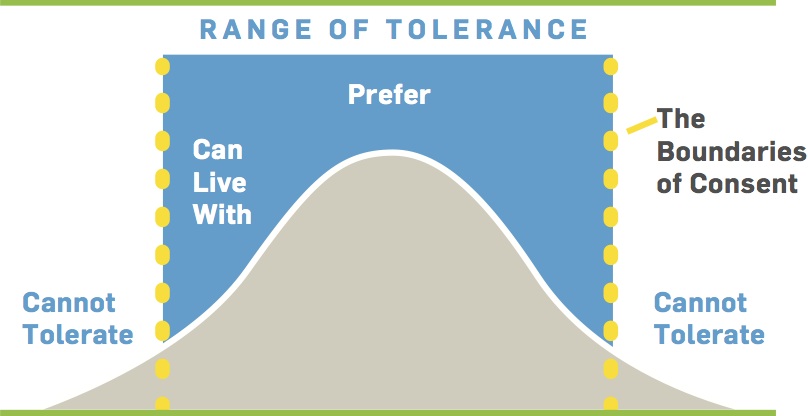Why not majority rule? Why not consensus?
People often think there are only two choices for how we make governance decisions: majority voting or consensus. Most people don’t realize that circles of decision-makers (“circles”) have a third option – decision-making by Consent – that can be preferable to either of these for governance decisions.
There is another option
The Consent Principle means that a decision has been made when none of the circle members has any significant objection to it; i.e. when no one can identify a risk that the group cannot afford to take. Those risks typically involve conflicts with the stated purpose or strategies, or the creation of conditions that would make it very difficult for a member to perform his or her role. Under those conditions, the group or person would be out of their range of tolerance.

An objection is supported by reasons that can be understood by other members. The intent is to understand those reasons and to find solutions that address the objection and bring the group back within its range of tolerance.
By Consent, circle members:
- Can choose to adopt any process, form, or method that enables it to make its decisions and carry them out.
- Can choose to use forms of decision-making other than consent, as long as:
- (1) the conditions for use are specific, documented, and have a defined term; and
- (2) the choice can be revisited if a member is no longer in consent.
- Can empower leadership roles and select the people who fill them.
- Can defer to individual, autonomous initiative.
- Can add or remove any member. When a circle considers adding or removing someone, the member being considered for addition or removal shall not participate in the consideration of or consent to the decision.
Why not majority rule for governance decisions?
A system is defined as a group of interacting, interrelated, and interdependent components that form a complex and unified whole. By definition, groups of people making decisions together are complex systems. Majority or autocratic rule enables decision-makers to ignore important feedback from the system, i.e. reasonable objections from other stakeholders.
Any short-term gains in efficiency from this kind of decision-making are often lost in the long-term as decisions are carried out. People who were not bought into the decision can withhold their support and even actively resist it. Problems that were ignored in the beginning can be costly to fix later. For these reasons, majority or autocratic rule is often a flawed choice as the basis for governance decisions.
Using the principle of consent, efficiencies can be found elsewhere:
- Once a high-level decision is made, circles can delegate autonomous decision-making and authority to individuals and teams around issues that are not complex, and/or that are within their expertise, to get things done.
- Members do not need to debate or persuade other members to minimize their objections. Debate is often more about winning than about wisdom. Circles use dialogue as a method of discourse, which is more about learning, so that the circle can wisely adapt its decisions and keep moving. Often, what is learned for one issue, can be applied over and again in subsequent conversations.
- When people know their concerns will be accounted for, they are likely to develop trust. Trust has been demonstrated in the research to reduce “transaction costs” over time.
Why not consensus?
Life is full of risks, complexities, diversity, and “both/and” situations. We often have to make decisions and try things out with an acceptable level of risk and without complete certainty. When we cannot make a decision or move forward until everyone agrees, or we treat every decision as a group decision, we diminish the agility we need to work in complex environments. For these reasons, consensus is often a flawed choice as the basis for governance decisions.
Consent often has better outcomes than consensus:
- Consent does not require agreement. Even if I don’t agree with your concern, I can listen to you and work to understand our different perceptions. Everyone can disagree on the perfect solution, and still consent to generate and try out new solutions that integrate our differences, within our range of tolerance.
- Consent is not about accommodating the “lowest common denominator.” It is about discovering solutions that emerge from the collective intelligence.
- Members don’t “block” governance decisions. If they cannot accept the proposed policy, they describe their objections with reasons that can be understood by other members of the circle and that reflect the shared purpose. The rest of the circle listens with the intent to understand those reasons, so they can find creative ways to adapt the decision to address the objections and meet the range of tolerance of the group.
- Consent is met with “good enough” solutions to move forward, including a timeframe for evaluation and a willingness to adjust and learn as we go.
We consent on governance decisions, when we need all the parts of the system. When issues are within someone’s domain, we empower individuals to make day-to-day, operational decisions with a level of autonomy to get the job done. A group might designate familiar operational roles such as a Chair, Point Person, Coordinator, Lead, Manager, or Teams to carry out governance decisions.
Clear delegation frees people from feeling they always need to make decisions together. Since the policies consented upon by the circle already have the buy-in from the people who are responsible for carrying them out and by those who are affected, operations become more efficient and cooperative.
Circle Forward Collaborative Governance Decision-making Package
- delivers training in the the Principle of Consent;
- defines when to use consent for decisions and when not to;
- introduces tools for making decisions within a Range of Tolerance;
- and clarifies key leadership practices; so you can create governance systems that are inclusive AND efficient.

